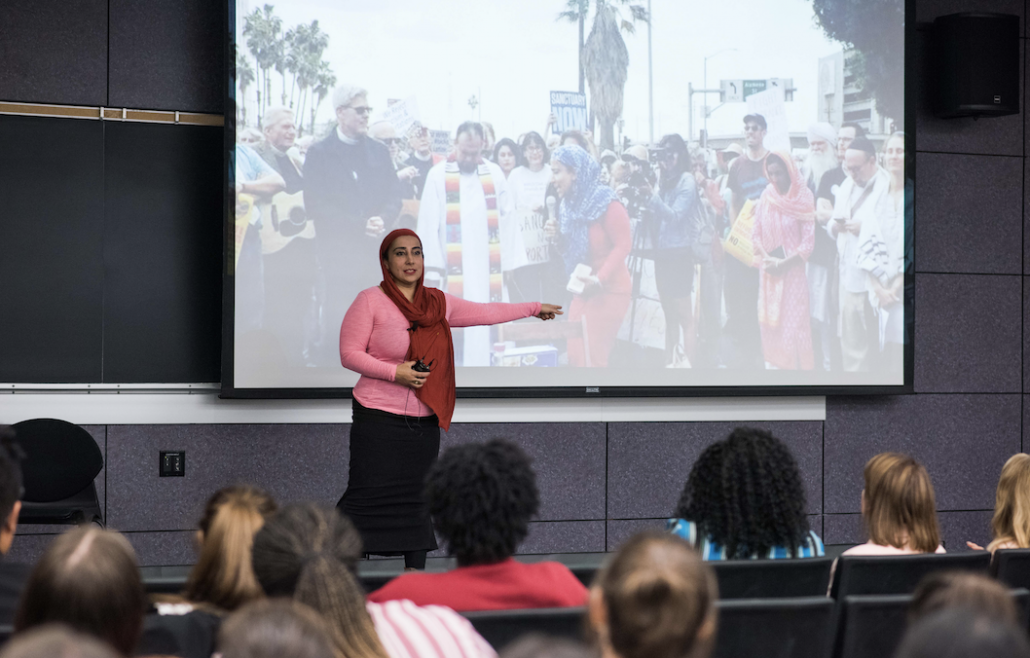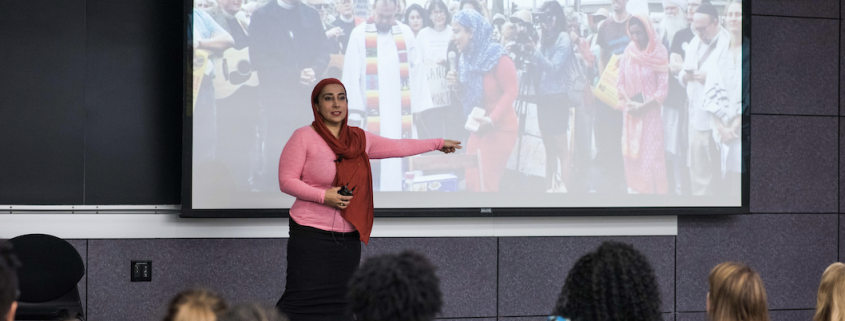Delta Phi Epsilon hosts summit on refugees, human rights

Speakers discussed the global refugee crisis and the experiences of asylum speakers at the Summit on Refugees and Human Rights hosted by USC’s foreign service fraternity Delta Phi Epsilon and the Global Policy Institute.
The lineup included Aicha Adoulaye Mahamane, an asylee from Niger, and Najeeba Sayeed, associate professor of interreligious education at Claremont School of Theology.
Shira Alcouloumre, vice president of external affairs at Delta Phi Epsilon, opened the summit with a short introduction and highlighted the importance of open conversations focused on global humanitarian crises.
“We decided to speak about the refugee crisis because it’s begun to dissipate from conversation as we’re focusing more internally on domestic instability,” said Alcouloumre, a junior majoring in international relations.
Mahamane told the audience about how she was abused as a young girl in Niger and forced into marriage at age 16 before she fled and sought asylum in the United States in 2004.
“Being an asylee in America … is not a choice. It’s your last option … something that you have to do,” Mahamane said. “The person that I was living with tried to make me his wife even though I was fleeing marriage in Niger. He forced me to have sex with him. He forced me to do things I didn’t want to do. I felt I didn’t have a choice because first of all I didn’t speak English, I didn’t know if I could trust [the] police.”
Through her journey, Mahamane said she found a support system in the Tahirih Justice Center, a nonprofit organization that provided her with access to a therapist and lawyers.
“When I met Tahirih Justice Center, they … helped me to file for my asylum cases and have my Green Card,” she said.
Mahamane also said she watched “The Ellen DeGeneres Show” to learn English and recalled the hope the comedian’s talk show gave her while she lived in New York City.
During the question and answer portion, Mahamane explained why young girls are forced into marriages in some countries. Mahamane encouraged audience members to push for young girls’ rights by educating girls and their parents.
“We need more institutions to empower young girls to know themselves and also to educate parents that … your kids have their own dreams and aspirations,” she said.
Sayeed, the summit’s second speaker, spoke about her experience organizing community initiatives in Los Angeles in response to the enforcement of stricter immigration laws by U.S. Immigration and Customs Enforcement.
“What we decided as clergy was that we were going to take back the space outside the Metropolitan Detention Center where ICE has been detaining undocumented and other detainees,” said Sayeed, who was the Southern California Mediation Association’s Peacemaker of the Year in 2007.
Himmat Sahi, a junior majoring in international relations, said he resonated with Sayeed’s discussion.
“I think it was really important framework for how we should treat the discourse of equality, especially as it pertains to refugees and Islamophobia,” Sahi said “I’m Sikh so this pertains a lot to my own sense of justice and how I should complete myself.”
Claire Liu, a sophomore majoring in economics and mathematics and one of the two event organizers, said she wanted attendees to come away from the summit with a renewed interest in the refugee crisis and the policies surrounding it.
“If we could spark more interest, more debate, more conversations about the humanity of these refugees, rather than our political ideologies, then I think this event has done its job,” Liu said.

